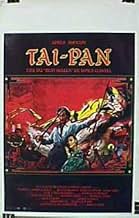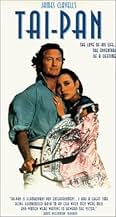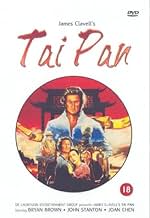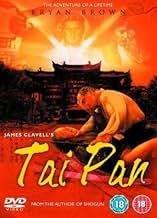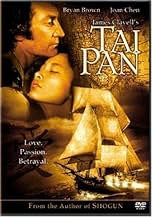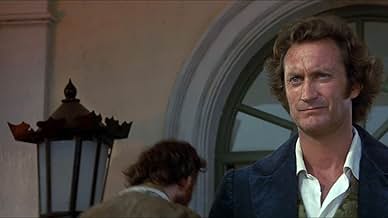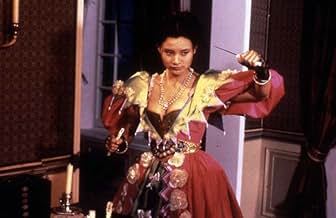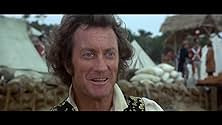Agrega una trama en tu idiomaHistorical fiction set against the backdrop of Hong Kong in its early years of British rule.Historical fiction set against the backdrop of Hong Kong in its early years of British rule.Historical fiction set against the backdrop of Hong Kong in its early years of British rule.
- Dirección
- Guionistas
- Elenco
- Premios
- 2 nominaciones en total
- Dirección
- Guionistas
- Todo el elenco y el equipo
- Producción, taquilla y más en IMDbPro
Opiniones destacadas
Last night on Turner Classic Movies, I saw a trailer from the sixties called "Lion Power" about all the big projects audiences could expect from MGM in the months and years ahead. Included among them were clips from "Far From the Madding Crowd" and "Where Were You When the Lights Went Out?", plus mention of "Where Eagles Dare" with Richard Burton (not mentioning Clint Eastwood, as perhaps he wasn't signed yet), "Ice Station Zebra", and "2001: A Space Odyssey" with very early-form artwork of its making. Among the many films mentioned in passing near the end of the trailer was "James Clavell's 'Tai-Pan'", yet no earlier version of the film was ever made. Just how long was this thing in the making, and what casts were potentially involved at different times? It would be interesting to see the planned history of such a movie that took so long to finally get made, bad as it reportedly is.
I found this movie to follow the novel pretty closely, considering of course that the novel is about 900 pages and the movie is only two hours! While not of the same outstanding caliber of adaptation as the Shogun miniseries, it nevertheless manages to generate some excitement and give a flavor for the happenings of that period, during which the colony of Hong Kong was founded.
Joan Chen was especially good as Mai-Mai, and all the other parts were at least adequately cast. The locations, sets and production values were of uniformly good quality. The only thing lacking was enough time to tell a story this long and complex--in such a short production one only has time to hit the high points of the plot. But it was enjoyable nevertheless.
Joan Chen was especially good as Mai-Mai, and all the other parts were at least adequately cast. The locations, sets and production values were of uniformly good quality. The only thing lacking was enough time to tell a story this long and complex--in such a short production one only has time to hit the high points of the plot. But it was enjoyable nevertheless.
As another reviewer put it, this movie was very similar to Dune. Very interesting comparison, since Raffaella De Laurentiis produced them both. This was her first project right after Dune. Both were sweeping epic sagas with multiple intertwined plotlines. Both should have been six or eight hour mini series and not feature films. As with Dune, you will find that if you have not read the book, you will not understand the movie. However, if you have read the book, then the movie isn't all that bad. James Clavell's 'Asian Saga' is one of my favorite book series, so I bought this movie cheap just to see it. The characters are like old friends to me, so I didn't think that the movie was all that bad. I realized while watching it though, that someone who had not read the book would not be able to keep up with all of the plot points. My suggestion to you is to read the book, then watch the movie. You will discover two things; first it's a super good book. Second, this movie had everything going for it in cast and settings; it just had too much story to tell in too short a time. It definitely should have been a six-hour miniseries.
TAI-PAN
Aspect ratio: 2.39:1 (J-D-C Scope)
Sound format: Dolby Stereo
1840's China: Thrown off the mainland because of his opium dealings, a western merchant (Bryan Brown) sets up home on the island of Hong Kong where he faces conflict from friend and foe alike in the lead-up to colonization.
Hugely derided at the time of its release, this handsome production - based on the novel by James Clavell, and directed by TV specialist Daryl Duke (THE THORN BIRDS) - plays to the gallery at every turn, embracing the book's labyrinthine plot and outrageous melodrama with unashamed fervour, an approach which appears to have sealed its fate at the box-office. The movie opens a little too abruptly, indicating a troubled post-production, but John Briley's busy screenplay (co-written with Stanley Mann) unfolds against a colorful historical backdrop and includes just enough nudity and violence to keep boredom at bay. Brown's performance is compromised by an unconvincing Scottish accent, and he's upstaged by Joan Chen (THE LAST EMPEROR) as the Chinese girl who loves him regardless of his failings, while handsome Tim Guinee (HOW TO MAKE AN American QUILT) is achingly sincere as Brown's naive young son, led astray by villainous merchants plotting his family's downfall. Also starring John Stanton, Russell Wong, Norman Rodway, Kyra Sedgwick and Bert Remsen in supporting roles. Production values strive to capture an epic feel and are largely successful, though no one's ever going to mistake this for "Lawrence of Hong Kong"! Italian makeup maestro Giannetto de Rossi (a regular contributor to the films of Lucio Fulci) provides some occasional flashes of gore, including a brief - but realistic - decapitation near the beginning of the picture.
Aspect ratio: 2.39:1 (J-D-C Scope)
Sound format: Dolby Stereo
1840's China: Thrown off the mainland because of his opium dealings, a western merchant (Bryan Brown) sets up home on the island of Hong Kong where he faces conflict from friend and foe alike in the lead-up to colonization.
Hugely derided at the time of its release, this handsome production - based on the novel by James Clavell, and directed by TV specialist Daryl Duke (THE THORN BIRDS) - plays to the gallery at every turn, embracing the book's labyrinthine plot and outrageous melodrama with unashamed fervour, an approach which appears to have sealed its fate at the box-office. The movie opens a little too abruptly, indicating a troubled post-production, but John Briley's busy screenplay (co-written with Stanley Mann) unfolds against a colorful historical backdrop and includes just enough nudity and violence to keep boredom at bay. Brown's performance is compromised by an unconvincing Scottish accent, and he's upstaged by Joan Chen (THE LAST EMPEROR) as the Chinese girl who loves him regardless of his failings, while handsome Tim Guinee (HOW TO MAKE AN American QUILT) is achingly sincere as Brown's naive young son, led astray by villainous merchants plotting his family's downfall. Also starring John Stanton, Russell Wong, Norman Rodway, Kyra Sedgwick and Bert Remsen in supporting roles. Production values strive to capture an epic feel and are largely successful, though no one's ever going to mistake this for "Lawrence of Hong Kong"! Italian makeup maestro Giannetto de Rossi (a regular contributor to the films of Lucio Fulci) provides some occasional flashes of gore, including a brief - but realistic - decapitation near the beginning of the picture.
Tai-Pan was probably too ambitious an undertaking for a film as short as just over 2 hours. Maybe a mini-series would have been the answer, but Tai-Pan certainly had the potential to be an oriental Gone With The Wind.
Unrealized potential though it is. The screenplay made many references to previous events in the novel that are not shown here. We do know there's one nasty rivalry going on between Bryan Brown and John Stanton who both rose to wealth in the China trade like the protagonists in an Edna Ferber novel.
Bryan Brown is the Far East version of Rhett Butler. He's built the family fortune on legal trade and illegal trade in opium. Not that opium was unknown before the British and other European powers got there, but they did turn it into a thriving business. When the Chinese government objected, the European powers took nibbles out of a prostrate and weakened state.
One of those nibbles the British took was Hong Kong, spoils from the Opium War of 1841. Brown like Margaret Mitchell's Rhett Butler or the hero of many Edna Ferber books is the guy who builds what became one of the busiest trading centers on the globe.
Unlike his rival Stanton, Brown's wife left him and took their small son back to the United Kingdom. Brown didn't mourn he took up with some Chinese women, they were pawns in various business negotiations. He got a son, Russell Wong, from one of them.
Things get interesting when his other son arrives from Great Britain played by Tim Guinee. He's a rather uptight Victorian youth who is not pleased with the debauchery he finds and his father's part in it.
Tai-Pan is exquisitely photographed with the climatic typhoon scene very well done indeed. A better screenplay would have been needed to tell this epic story.
Unrealized potential though it is. The screenplay made many references to previous events in the novel that are not shown here. We do know there's one nasty rivalry going on between Bryan Brown and John Stanton who both rose to wealth in the China trade like the protagonists in an Edna Ferber novel.
Bryan Brown is the Far East version of Rhett Butler. He's built the family fortune on legal trade and illegal trade in opium. Not that opium was unknown before the British and other European powers got there, but they did turn it into a thriving business. When the Chinese government objected, the European powers took nibbles out of a prostrate and weakened state.
One of those nibbles the British took was Hong Kong, spoils from the Opium War of 1841. Brown like Margaret Mitchell's Rhett Butler or the hero of many Edna Ferber books is the guy who builds what became one of the busiest trading centers on the globe.
Unlike his rival Stanton, Brown's wife left him and took their small son back to the United Kingdom. Brown didn't mourn he took up with some Chinese women, they were pawns in various business negotiations. He got a son, Russell Wong, from one of them.
Things get interesting when his other son arrives from Great Britain played by Tim Guinee. He's a rather uptight Victorian youth who is not pleased with the debauchery he finds and his father's part in it.
Tai-Pan is exquisitely photographed with the climatic typhoon scene very well done indeed. A better screenplay would have been needed to tell this epic story.
¿Sabías que…?
- TriviaProducer Martin Ransohoff and the Metro-Goldwyn-Mayer studio in 1966 acquired the rights to James Clavell's source "Tai-Pan" novel for US $500,000. The movie was then announced by MGM in 1967-68 to star Patrick McGoohan to play Dirk Struan, to be directed by Michael Anderson, with source novelist Clavell writing the screenplay. The picture was originally budgeted to cost US $26 million which was then reduced to US $20 million. The project sat around stagnant for a time in development hell. However, after severe operating losses, the epic was one of a number of expensive projects the new management at the MGM studio dropped as being too costly. The project and the development of the movie at MGM was in the end canceled by executive James T. Aubrey.
- ErroresIn a scene, set in 1841, several of the ladies were wearing bright mauve outfits. That would have been most unlikely for the wives of middle class traders at that time as the color purple was prohibitively expensive before the invention of analine dyes in London - in 1856. By 1870 these gaudy colors had become so cheap and commonplace that it became a status symbol to mimic the subtler, paler colors of the pre analine dye days.
- Citas
Dirk Struan: No emperor has seen the guns of a British man-of-war.
Selecciones populares
Inicia sesión para calificar y agrega a la lista de videos para obtener recomendaciones personalizadas
- How long is Tai-Pan?Con tecnología de Alexa
Detalles
- Fecha de lanzamiento
- País de origen
- Idioma
- También se conoce como
- Tai Pan
- Locaciones de filmación
- Chen Family Temple - Guangzhou, China(Commissioner Lin's court)
- Productora
- Ver más créditos de la compañía en IMDbPro
Taquilla
- Presupuesto
- USD 25,000,000 (estimado)
- Total en EE. UU. y Canadá
- USD 4,007,250
- Fin de semana de estreno en EE. UU. y Canadá
- USD 1,863,469
- 9 nov 1986
- Total a nivel mundial
- USD 4,007,250
- Tiempo de ejecución2 horas 7 minutos
- Mezcla de sonido
- Relación de aspecto
- 2.35 : 1
Contribuir a esta página
Sugiere una edición o agrega el contenido que falta

Principales brechas de datos
By what name was Tai-Pan (1986) officially released in India in English?
Responda
